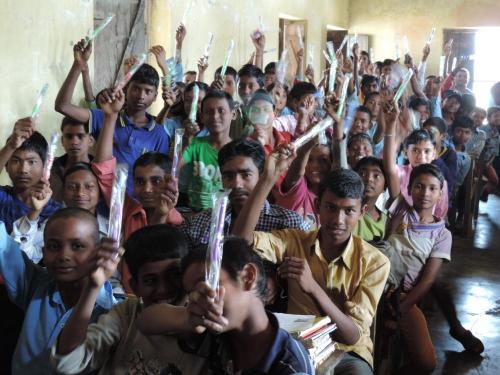
I walked into a school today stopping first at the Headmaster's office and noticed two old desks, a number of benches and five men sitting, doing nothing. There were no computers, the only information on one of the walls had been pasted there long ago. I poked my head into an English class where the boys sat at old, long wooden tables on one side with the girls on the other. There was nothing on the walls, except dull, yellow, washed out, peeling paint. When I asked the children questions hardly any of them seemed to understand me; maybe they were shy, maybe my accent wasn't clear or maybe they just weren't picking up English. A few of the students understood my questions and did speak very fluent English, an encouraging sign. I asked the teacher for a piece of chalk, so that I could write some words on the blackboard but there was none to be found.
I walked into another classroom, there was no teacher present; in another 60 children sat crammed onto a number of benches and tables. I wondered, "How many children get lost in this system?"
I was at the school with the PKMMH dentist and one of the marketing staff to educate classes 6-7 about proper dental hygiene. There were possibly 150 children in the room, along with some teachers and administrators. Based on our last experience at the school we told the Assistant Headmaster that teachers must be present during the lecture to ensure follow-up.
Our dentist spoke with the children, answered questions; I spoke about preventative health care, taking care of one's body and showed the children, possibly for the first time, how to floss their teeth.
This experience was not unusual; the schools in this area typically have nothing on the walls to stimulate children. All lessons are done by rote learning as opposed to teaching critical thinking and questioning.
The children paid attention to the dentist for about 15 minutes and then they started talking to one another as one of the adults asked a question which the dentist answered. Although I don't speak Nepali, our marketing person translated what I was trying to communicate and the children listened, after all, I'm an American.
My realization was that this is a great opportunity because, unlike other institutions we are showing that we care. A recent report about hospitals and food nutrition, "Utilization of Community Benefits to Improve Health Food Access in Massachusetts" stated, "Meet Them Where They Are- Nearly every interviewee highlighted the importance of bringing programs to the community instead of asking community members to come to the hospital. From a logistical perspective hosting activities and events in the community removes transportation and time barriers thereby increasing participation. A lack of comfort with the hospital environment was cited as another barrier that kept some people from participating in activities hosted on-site. Lastly, from a philosophical perspective some interviewees felt that hosting activities at community centers demonstrated a respect for the community."
"Strong Partnerships are the Backbone of Community Programs Interviewees repeated their reliance on strong community partners at all stages of program development and implementation. Hospitals relied on community health centers, schools, non-profit organizations and city governments not only to identify needs but also to determine the best strategies for addressing those needs. These community groups have strong and enduring relationships with the residents that hospitals are trying to reach. It is through these relationships that hospitals establish trust and gain entrance into the lives of the individuals they aim to serve. Several interviewees noted that they maintain ongoing relationships with multiple community entities in order to stay current on community needs and stay ahead of emerging trends."
Reading the above points I couldn't help but feel that these statements have implications for every part of the world, no matter a person's educational level, location, etc. We all have a responsibility to help educate others to help themselves. It's not about my way or your way, it's about providing alternatives and letting the individual decide. It is vital to provide, e.g. basic health information to, especially children, so that they can properly take care of their bodies and educate their parents. We all have this opportunity.










Add new comment